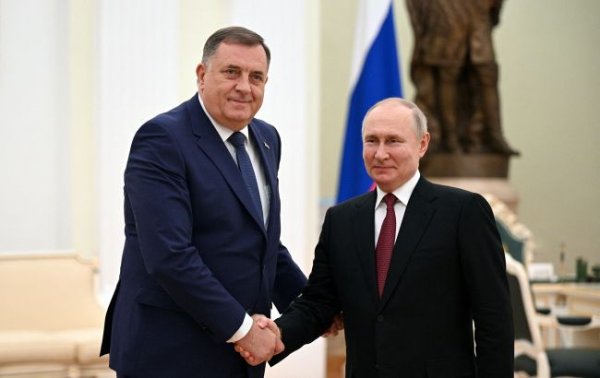
Republika Srpska President Milorad Dodik and Russian dictator Vladimir Putin (Photo: Getty Images) Author: Dmitry Levitsky
Read about whether a new hot conflict could flare up in the Balkans, what role Donald Trump's rise to power in the US plays in the events, and how Russia's war against Ukraine is connected with security in the Balkans in the article by RBC-Ukraine journalist Dmitry Levitsky.
CONTENT
- Bosnia's “midlife crisis”
- Vucic's “Colored” Flashbacks
- Anti-Serbian military alliance
If a political leader is put on the wanted list in his home country, there is a high probability that this political leader will soon be noticed in Moscow. The leader of the Republika Srpska (RS), Milorad Dodik, has followed this well-trodden path. Although Dodik is not the head of state, but only the head of a territorial entity – RS – within Bosnia and Herzegovina. But still, through his efforts, with full support from Russia, perhaps the most acute political crisis since the wars of the 1990s has been created in the Balkans.
That is why the authorities of Bosnia and Herzegovina recently launched the procedure of putting Dodik and the speaker of the parliament of the Republic of Srpska, Nenad Stevandić, on the international wanted list. Before that, Dodik was sentenced to one year in prison and banned from politics for six years due to separatist aspirations.
Known for his pro-Russian position and desire to separate from Bosnia and Herzegovina (BiH), Dodik initiated the adoption of a law prohibiting state judicial bodies and police from operating on the territory of the RS.
The BiH Constitutional Court temporarily blocked the decision, and Bosnian prosecutors ordered the RS leader's arrest. But despite the internal arrest warrant still in place, Dodik traveled to neighboring Serbia last week and then arrived in Moscow.
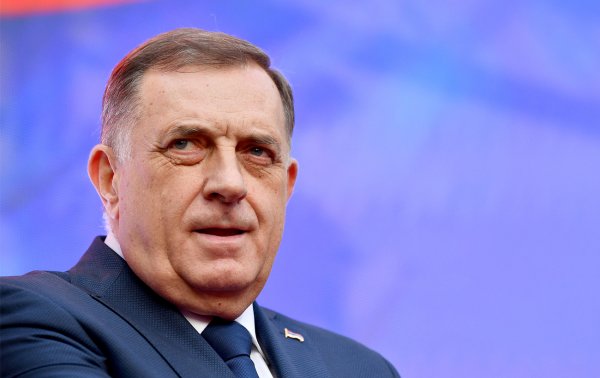
Bosnia wants to put Milorad Dodik on an international wanted list (Photo: Getty Images)
Meanwhile, the largest protest in Serbia's history took place in Belgrade. Thousands of Serbs took to the streets demanding that the authorities of President Aleksandar Vucic conduct a transparent investigation into the tragedy at the Novi Sad railway station (14 people died there in November 2024 when a roof collapsed) and punish those responsible.
The security forces tried to disperse the protest and even allegedly used an acoustic weapon against the protesters – a so-called sound cannon. And then, in order to calm the masses – the Serbian authorities decided to dismiss the government. However, this did not help and the protests continue.
And amid the instability caused by Donald Trump's return to the White House and the threat of US troops withdrawing from Europe, neighbouring Kosovo is seeking alternatives to NATO's peacekeeping mission and has agreed on a military alliance with Croatia and Albania, countries that have had military conflicts with Serbia.
What is happening in the Balkans and whether these small flames can grow into a huge fire in the middle of the European continent – we will tell you in more detail below.
Bosnia's “midlife” crisis
Almost 30 years ago – in November 1995 – in the American city of Dayton, Serbia, Croatia and Bosnia and Herzegovina signed a peace agreement that provided for the preservation of the sovereignty and territorial integrity of the latter, but divided it into two autonomous entities: the Federation of Bosnia and Herzegovina and the Republika Srpska. The central government received limited powers, while a significant part of the power remained at the level of these two entities.
A UN High Representative has been appointed to monitor the situation in the autonomous parts of BiH. He has broad powers, including the right to overturn decisions of local authorities and dismiss officials if they threaten the stability of the country.
After taking over as RS president in 2010, Dodik began to stir things up by pushing for secession from BiH. He has repeatedly proposed holding a referendum on independence for a Serbian autonomy, and in 2023 he called for joining BRICS, despite the pro-European course of BiH, which officially seeks to join the European Union. For a long time, Sarajevo forgave Dodik for his antics, but last year patience snapped.
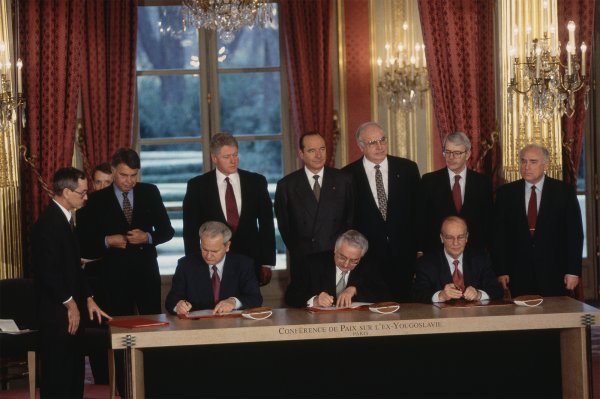
Bosnia and Herzegovina exists on the basis of a nearly 30-year-old peace agreement (Photo: Getty Images)
In June 2024, the National Assembly (as the RS parliament is called) passed a law prohibiting the publication of decisions of the Office of the High Representative in the Official Gazette of the RS. This was another step in the confrontation with official Sarajevo, after the non-recognition of Christian Schmidt as the High Representative as such and the ban on cooperation with him. Despite the cancellation of these decisions by Schmidt, the deputies passed another law – on the non-implementation of decisions of the Court of BiH.
In response, the BiH prosecutor's office brought charges against Dodik and the head of the Official Herald of the RS, Milos Lukic, in August (the latter was acquitted). Dodik was accused of attempting to destabilize BiH and facilitate the secession of the RS from the state. The trial was marked by delays, blocking of the court building and provocations. On February 26, the court issued a verdict, putting an end to this high-profile case.
The RS parliament responded to this court decision by banning the activities of the national police and the judicial system of BiH on Serbian territory, which further deepens the division between the autonomous parts of Bosnia.
The latest decisions by Dodik and the Republika Srpska authorities under his control are connected with the warming between Washington and Moscow after Trump's return, international observer and editor of the Balkan Observer portal Natalia Ishchenko noted in a conversation with RBC-Ukraine.
Back in December 2023, Dodik hinted in an interview with Serbian TV Prva about his intentions to separate RS from Bosnia in the event of a second Trump presidency. And already this year, the new Trump administration has made it clear that Europe's problems are the business of Europeans.
“Dodik decided that now no one will scold him, and he will do what he had planned for a long time,” Ishchenko believes.
In her opinion, all of Dodik's moves are aimed at making the Republic of Srpska a de facto independent and separate entity with its entire vertical structure. So that when a “window of opportunity” appears, they can carry out the separation de jure.
Such a development of the situation will obviously provoke instability on the European continent, which will be beneficial to no one else but Russia. Dodik has long agreed to be “the Kremlin's useful idiot,” said Cedomir Stojkovic, former director of the Christian Democratic Party of Serbia, in a commentary to RBC-Ukraine, because it was not difficult to convince him of everything that Moscow wanted to impose on him.
“For years, he built his political image in Republika Srpska on the narratives that Russia was promoting in Bosnia and Herzegovina. Thanks to this, Russia was conducting psychological operations among the RS population, and Dodik, as a useful idiot, used the consequences of these operations to strengthen his political position among the citizens, riding the wave of narratives that Russia was sowing,” explained Stojkovic, who now heads the October Group, which is engaged in recognizing the Kremlin's hybrid operations.
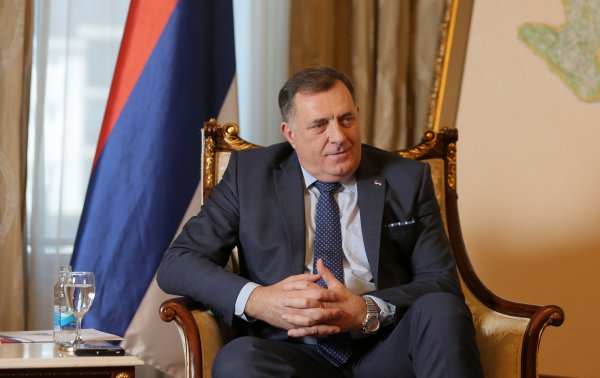
Milorad Dodik has long been working for the Kremlin for his own purposes (photo: Getty Images)
Another important factor is that Bosnia and Herzegovina with its constitution exists under a temporary peace agreement that is almost 30 years old, Natalia Ishchenko noted in a conversation with RBC-Ukraine. And while the Bosnians are striving to create a full-fledged state, the Serbs perceive this as a departure from the primary plan of the Dayton Agreement, which envisaged greater independence for the RS.
The division of Bosnia and Herzegovina is a scenario that Europe cannot afford. And there are three reasons for this, according to Stojkovic: it would create a new Russian-controlled state in Europe, weaken Europe's position vis-à-vis Moscow, and open a “Pandora's box” across the European continent.
“Under these circumstances, the only inevitable outcome is that RS will remain part of BiH, and Europe will do everything necessary to ensure that this remains the case. The only scenario in which this separation could happen in the current context is if Ukraine loses the war against Russia, allowing Moscow to become a powerful blackmailer for Europe. That is why all these issues are interconnected, and smart politicians in Europe understand this, so they will not allow either of these scenarios – separation or Russia's victory – to come true,” Stojkovic believes.
As for Dodik, both experts believe that he will be arrested as soon as possible. After all, this is not only a legal issue, but also a security issue. However, first we need to wait for the right moment when the risks of escalation are minimized.
“This is the only reason why he has not been arrested yet. However, just as they once asked about Slobodan Milosevic, who was accused of war crimes in The Hague, or about the numerous generals who were tried for the same crimes – why have they not been arrested yet? In the end, they were all arrested and convicted. And the same will happen with Dodik,” Stojkovic concluded.
Dodik's loyal political partner for a long time has been the president of neighboring Serbia, Aleksandar Vucic. But he, too, now has many problems of his own.
Vucic's “Colored” Flashbacks
The student protest against Serbian authorities and corruption that took place in Belgrade on March 15 was the largest since the overthrow of Slobodan Milosevic's regime. The participants' formal demands were to disclose all documentation on the corruption that led to the tragedy in Novi Sad, to identify those who attacked the protesters, and to release all those detained at previous protests.
However, according to Stojkovic, the informal demands are much louder and more powerful, uniting a record number of protesters: the resignation of the government, the resignation of Vucic and sending him and key figures of the corrupt system into the historical past.
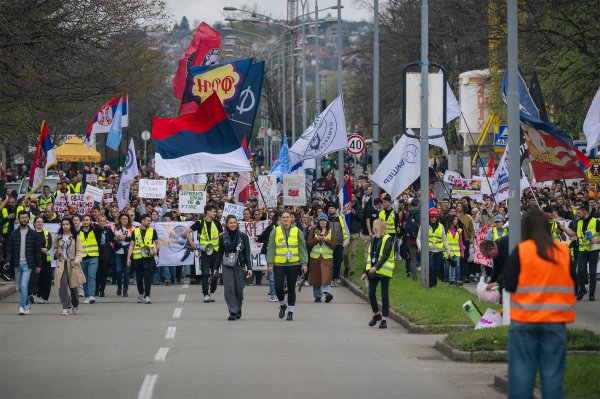
In mid-March, a large-scale protest took place in Serbia (photo: Getty Images)
The tragedy in Novi Sad is only a trigger that provoked an escalation of civil discontent that had been smoldering for 12 years, Stojkovic noted. According to him, Vucic had been using various methods to retain power for years, similar in particular to the Russian ones: controlled media and pressure on voters, while maintaining formal democracy. The secret services intimidated the opposition, and corruption reached an unprecedented level, strengthening Vucic's power.
At the same time, as Natalia Ishchenko noted in a commentary to RBC-Ukraine, the Serbian protests, which have been going on in one form or another since last November, are not geopolitical in nature. For example, there are no EU flags or Euro-integration slogans. On the contrary, some protesters, among other things, demand “not to surrender Kosovo.”
However, according to Stojkovic, the assertion about the “danger of pro-Russian forces coming to power after Vucic” is a joint propaganda and political operation by Vucic himself and Moscow. In fact, there is no such threat, he believes.
“The opposition parties are much more pro-European than this government has ever been. Of course, after decades of Russia's hybrid attacks on Serbia and powerful Kremlin propaganda, there are certain pro-Russian elements in the opposition. But the main pro-Russian forces are in the ranks of the current government. Half of the Serbian government consists of pro-Russian ministers, and a third of the current government are direct agents of the Kremlin,” Stojkovic is convinced.
In addition, there are no radical elements in the parliamentary opposition, and those pro-Russian radicals who are not part of Vucic’s party were unable to enter parliament in the last elections, despite assistance from the Russian Federation.
The Serbian president has already dubbed the protest in Belgrade as an attempt at a “Maidan”, apparently hinting at the Ukrainian Revolution of Dignity. Vucic likes to scare Serbs with “Maidans” and “color revolutions” whenever any anti-government actions begin. Ukrainians usually perceive this as a reference to our revolutions, but, according to Ishchenko, in fact, this is not about them.
“Serbia is the cradle of the 'color revolution.' The first so-called 'color revolution' happened when the Serbs overthrew the Milosevic regime,” Ishchenko explained.
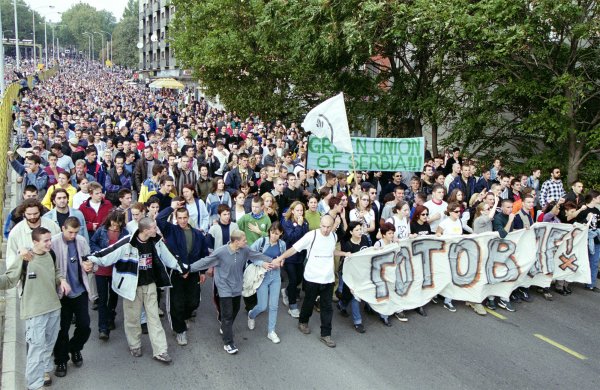
The first “color revolution” took place in Serbia against the Milosevic regime (photo: Getty Images)
Vucic was part of Milosevic's team at that time, so when he talks about the “Maidan”, he first of all remembers those times, and not Ukraine, Ishchenko believes.
“He knows very well what we are talking about. And that is why he announced that he has already started writing a book about how to fight “color revolutions”. Vucic believes that he has defeated this “color revolution”, did not allow it, and so on,” she tells RBC-Ukraine.
And Vucic is being helped to fight the protests by none other than Moscow. Russia is deeply involved in efforts to prevent a change of power in Serbia, knowing that the next government will not be pro-Russian, Stojkovic is sure.
“However, recent decades have shown that the Kremlin always plays both sides: supporting a pro-Russian government, it simultaneously seeks to influence the opposition in order to maintain its influence in the target country during a change of power. This situation is no exception. It would be useful if Europe, Ukraine and the West in general helped the Serbian opposition to recognize these attempts by the Kremlin, strengthening their resistance to such influence. In any case, the Kremlin will not be able to exert the same influence on the future government as it did on the current one,” he believes.
Anti-Serbian military alliance
Meanwhile, in late March, Kosovo's Defense Minister Ejup Makedonci signed a declaration on security and defense cooperation with his counterparts from two NATO countries, Croatia and Albania. The three countries agreed to work to increase interoperability between their militaries through joint training and to engage in combating hybrid threats.
“This cooperation is not a threat to anyone, but an additional commitment to maintaining peace and stability in the Western Balkans region. Together with Albania and Croatia, Kosovo is stronger, the region is safer, and the world is more stable,” Makedonci said.
This de facto military alliance between countries that have had military conflicts with the Serbs in their history has predictably caused irritation in Belgrade, which called the declaration an “open provocation.”
However, the reason for this alliance, according to experts, lies precisely in Serbia, as well as in the policy of the current US administration. If Trump decides to withdraw the American contingent from Europe, including from the NATO peacekeeping mission in Kosovo (KFOR), this will threaten stability in the region.
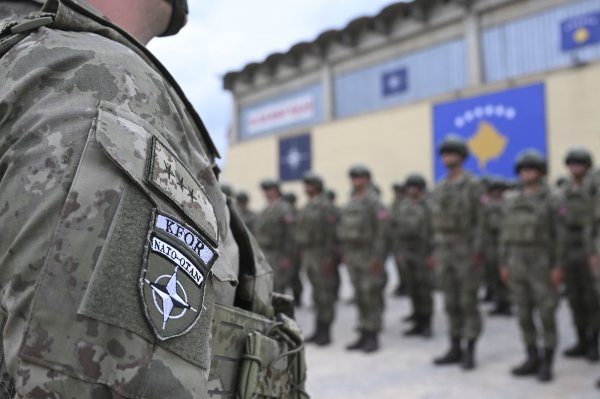
Kosovo seeks alternative to NATO peacekeepers (Photo: Getty Images)
“When it comes to Europe's strategic moves in the region, it is obvious that Europe is preparing for all possible scenarios on the continent. Kosovo is not part of NATO, which means that if America leaves the European security architecture, Kosovo will be left without formal alliances. That is why this new alliance is being formed,” Stojkovic explained.
Serbia responded to the Kosovo-Croatian-Albanian alliance with a defense agreement with Hungary, which provides for dozens of joint programs in 2025, including military exercises and shooting. It is no secret that Budapest sympathizes with the Serbs, Ishchenko noted in a conversation with RBC-Ukraine, and this creates threats for Bosnia and Kosovo, because the Hungarian contingent is in peacekeeping missions on their territories.
“Even the Bosnians have already asked to remove the Hungarians from the peacekeeping contingent in BiH, because they openly support Dodik. There are also Hungarians in the NATO peacekeeping contingent in Kosovo. In Pristina, they believe that the Hungarians do not guarantee them anything. Perhaps they guarantee the Serbs, but not them,” she added.
If Trump really does disrupt the security architecture of this part of Europe, escalations are certainly possible, Stojkovic believes. But they will only happen if Russia orchestrates them. In his opinion, the only state capable of causing such an escalation is Serbia, under Russian influence. Therefore, he says, it is extremely important to change the Serbian government to one that would not seek such escalations under any circumstances.
***
Russian aggression against Ukraine is closely linked to the security situation in the Balkans, Europe and the world as a whole. If the war ends in an unfair peace for Ukraine, it could signal new geopolitical changes, particularly in the Balkans.
According to Ishchenko, the precedent of changing borders in Europe, or even the suggestion of it, could provoke separatist movements in the Republic of Srpska, and Serbia might be tempted to regain control over Kosovo.
However, the root causes of instability in Europe are Russia, Stojkovic believes. Therefore, Europe needs to understand that only Russia's defeat in Ukraine can guarantee peace on the European continent. And any peace achieved without victory will be only a prelude to a larger war – a future conflict that will not be limited to Ukraine.
In preparing the material, publications from Politika, Reuters, Radio Evropa e Lirë, statements by Serbian and Kosovar officials, as well as comments from international observer and editor of the Balkan Observer portal Natalia Ishchenko and former director of the Christian Democratic Party of Serbia, current president of the October Group Cedomir Stojkovic were used.
